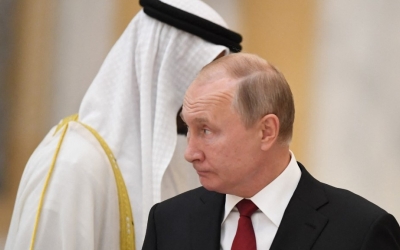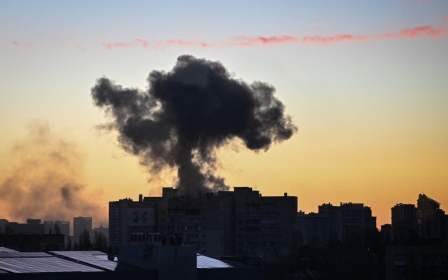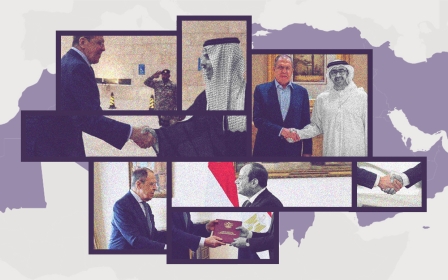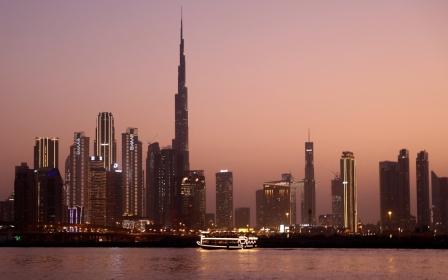Pentagon leak is no surprise: UAE-Russia ties run deep
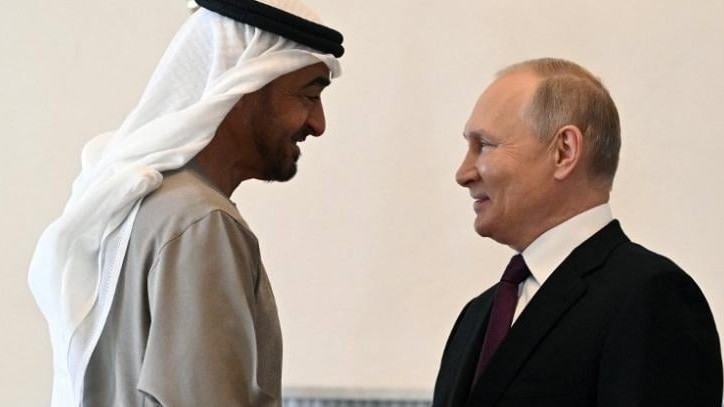
One item in the latest Pentagon leak reviewed by the Associated Press suggests that American spies caught Russian intelligence officers boasting that they had convinced their Emirati counterparts to work together against US and UK intelligence agencies - quite an allegation against one of the closest partners of Washington and London in the Middle East.
Most importantly, it comes at a time when Abu Dhabi’s ever-more intimate relationship with the Kremlin has come under increasing scrutiny by its western partners, who are suspiciously eyeing the UAE’s active support for Russian sanctions evasion.
While the authenticity of the leaked documents was neither confirmed nor denied by US officials, the allegations made by Russian operatives are in line with a growing integration of shadowy Emirati and Russian networks in recent years.
By all accounts, Abu Dhabi has become the most important strategic partner for the Putin regime - not just in the Middle East, but also in Africa.
Unlike other Gulf countries, the UAE has developed personal, elite-level relationships with the inner core of the Kremlin. Emirati statecraft under President Mohammed bin Zayed has developed via semi-private networks involving trusted technocrats and organisations directly tied to the most powerful branch of Abu Dhabi’s royal family, the Bani Fatima. It is here that the Kremlin’s own network-centric statecraft apparatus found receptive nodes with which to connect.
New MEE newsletter: Jerusalem Dispatch
Sign up to get the latest insights and analysis on Israel-Palestine, alongside Turkey Unpacked and other MEE newsletters
In this context, it is also important to appreciate that the UAE has delegated much of its intelligence and information operations to an informal network of surrogates. These networks provide the Bani Fatima with plausible deniability and control over strategic activities outside the hierarchies of state bureaucracy.
The UAE and Russia alike do not rely much on formal intelligence institutions, but rather on informal information and intelligence networks. It is thus not just the formal institutional relationship between Russia’s intelligence services and their Emirati counterparts that matters, but the strategic personal relationships that have helped to synchronise Russo-Emirati activities in the shadows.
Intelligence integration
The close relationship between Mohammed bin Zayed and Russian President Vladimir Putin aside, bilateral ties depend on personal linkages between key nodes in both countries’ governance networks.
The most important one is Mikhail Bogdanov, Putin’s Middle East envoy, who often visits the UAE and tends to directly engage Mohammed bin Zayed’s foreign policy adviser, Anwar Gargash. Another frequent visitor to Abu Dhabi has been Nikolai Patrushev, Putin’s national security chief, who has held meetings with his Emirati counterpart, the president’s brother, Tahnoun bin Zayed; and his trusted technocrat, Ali al-Shamsi, who is in charge of Emirati spy operations.
As Abu Dhabi is actively looking to boost its status as a middle power in a multipolar world, it refuses to choose sides
It was also Patrushev who introduced the Abu Dhabi leadership to Putin’s spy chief, Sergey Naryshkin, who came for an extended visit to the Emirates in 2020 to formalise intelligence coordination on important regional files.
One of the first tangible cases of strategic UAE-Russian intel integration that I came across while researching my 2023 book Subversion was the synchronised attempt by both Abu Dhabi and Moscow to undermine the integrity of the 2016 US presidential election. Both Putin and Mohammed bin Zayed had a vested interest in getting Donald Trump into the White House.
As the Mueller investigation showed, activities were coordinated by George Nader - a close aide of Mohammed bin Zayed - who also maintained close links to the Kremlin.
Just days before Trump’s inauguration in January 2017, Mohammed bin Zayed arranged for something out of a Bond movie: a secret meeting in the Seychelles between infamous mercenary chief Erik Prince, viewed as a conduit to the Trump campaign, and Kirill Dmitriev, who runs Russia’s sovereign wealth fund - all with the intent of creating a clandestine backchannel between the Kremlin and the Trump White House.
Undermining the West
A year later, the Bani Fatima facilitated Wagner Group’s “market entry” into Abu Dhabi’s backyard in North Africa. In late 2018, Wagner - a network of companies serving a notorious mercenary force - was trying to expand Russia’s geo-strategic reach beyond its limited operations in Ukraine and Syria.
Libya offered the Kremlin’s guns-for-hire an opportunity to support Abu Dhabi’s protege warlord, Khalifa Haftar, in an effort to create a bridgehead on the African continent. Russia’s networks saw an opportunity to actively undermine the regional objectives of the United Nations, the US and the UK in Libya.
Abu Dhabi apparently helped to bankroll Wagner operations in Libya and provided avenues for Wagner to bring extracted gold to market. UAE-based companies, such as Kratol Aviation, provided logistical support to Wagner’s dogs of war.
While Wagner might have outgrown its surrogate relationship with the Kremlin, it remains a key node in Russia’s foreign policy and intelligence network. Offensive military services aside, Wagner has also been instrumental in Russian intelligence and information operations across the West and the African continent.
A range of synchronised offensive information operations conducted by Emirati and Russian networks underpin what is at its core an ideational partnership. Russian hackers with links to Russia’s intelligence services have washed up on the shores of Abu Dhabi since the beginning of the Ukraine war, being hired by Emirati information warriors.
Hence, Russian spies boasting about deepening ties with Emirati counterparts are in line with recent developments.
As the UAE has become Russia’s most important ally to bust western sanctions, second-tier intelligence cooperation and integration between the two authoritarian regimes does not buck the trend. Quite the opposite: as Abu Dhabi is actively looking to boost its status as a middle power in a multipolar world, it refuses to choose sides, forging ever-closer ties with western competitors in the East.
Yet, while the UAE never claimed to be a friend of the West, it has already used its joint networks with Russia to undermine US and UK objectives in the Middle East and Africa - not least in Libya.
The views expressed in this article belong to the author and do not necessarily reflect the editorial policy of Middle East Eye.
Middle East Eye delivers independent and unrivalled coverage and analysis of the Middle East, North Africa and beyond. To learn more about republishing this content and the associated fees, please fill out this form. More about MEE can be found here.



